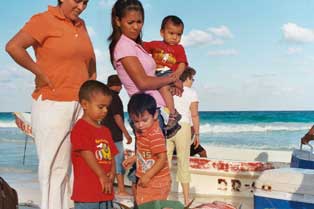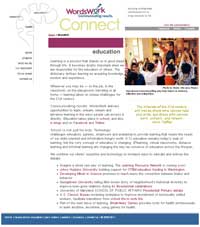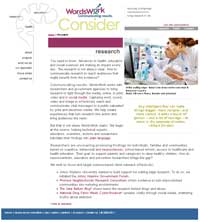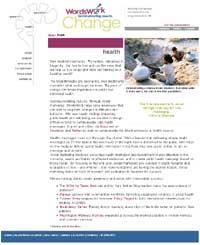JOHNS HOPKINS AFFILIATE JHPIEGO WINS $75 MILLION AWARD
USAID Program to Save Lives of Women and Families Worldwide
Baltimore, Md. – JHPIEGO, an international health organization at The Johns Hopkins University, has received a five-year award of $75 million from the U.S. Agency for International Development to lead ACCESS, a program to save the lives of mothers and newborns in developing nations.
JHPIEGO is a 31 year-old organization dedicated to improving health care for women and families. It builds capacity in developing countries by training and supporting local healthcare providers, including doctors, nurses, midwives, and health educators, in areas where few if any providers currently practice.
JHPIEGO works throughout Africa, Asia, the Middle East, Latin America and Europe. Its partners in the ACCESS program include Save the Children, the American College of Nurse-Midwives, the Futures Group, the Academy for Educational Development, and Interchurch Medical Assistance.
“JHPIEGO and our partners are proud to lead this country’s flagship program to provide improved care for women and children in developing countries,” said Leslie D. Mancuso, CEO of JHPIEGO. “We will develop the health infrastructure that gives critical support to women and families. We will foster the adoption of proven practices that are the best hope for a healthy future. Through ACCESS, we can make sure that women give birth in clean and safe surroundings, with a trained birth provider and the support of their community, so that mothers and newborns, especially in the critical first days of life, survive and thrive.”
ACCESS, providing “Access to Clinical and Community Maternal, Neonatal and Women’s Health Services,” is a follow-on program to JHPIEGO’s Maternal and Neonatal Health Program (MNH Program), which also was funded by USAID. Through ACCESS, JHPIEGO and its partners will build on the MNH Program’s successes in increasing survival rates of mothers and newborns in 18 countries, from Guatemala to Indonesia, from Zambia to Nepal, since the MNH Program’s inception in 1998. Through the MNH Program, JHPIEGO and its partners have developed global guidelines, best practices and evidence-based treatments and made them work in countries. They have educated in-country experts who can practice, teach, and advocate for communities, patients and families. They have mobilized communities to demand more and better quality health care. They have introduced infection prevention techniques and a rigorous quality improvement process instituted at local hospitals and clinics.
ACCESS supports the global momentum and commitment for maternal, newborn and women’s health, and represents wider implementation of the best practices and programs piloted through MNH: interventions for birth preparation and safe delivery, integrating care for mothers and newborns, and identifying and training skilled birth attendants. To ensure improved outcomes for mothers and their newborns, ACCESS will scale up proven best practices in essential maternal and newborn care such as the prevention of malaria in pregnancy and the reduction of bleeding in childbirth or postpartum hemorrhage—the leading cause of maternal death worldwide. The new program’s approach to integrating maternal and newborn care is not only the best way to ensure that mother and baby both receive essential health and nutrition services, it is also the most economical way to deliver services.
In addition, the program will build on community mobilization efforts that have been proven to increase chances for maternal survival in rural communities throughout the developing world. The ACCESS Partnership will engage policymakers, providers, and other key stakeholders to ensure that integrated, high-quality services reach women, families, and communities, particularly marginalized and vulnerable populations.
Through existing partnerships, ACCESS will continue to disseminate state-of-the-art practices for maternal, newborn, and women’s health and further define and scale up new strategies for linking women and newborns with basic life-saving services.
“Each year, more than 500,000 women die in childbirth,” Mancuso said. “Through our work in MNH we were able to change the paradigm from maternal deaths to saving women’s and newborns lives – through training and providing more skilled birth attendants at childbirth, through infection prevention techniques, through active treatment to avoid bleeding in childbirth.
“We know how to ensure survival. Every family in the world has the right to demand access to quality care that makes the difference between life and death. Through ACCESS, we can begin to turn that promise into a reality. Women and children deserve nothing less. ”
About JHPIEGO
JHPIEGO, an international health organization affiliated with The Johns Hopkins University in Baltimore, Md., builds global and local partnerships to enhance the quality of healthcare services for women and families through training and support for healthcare providers including doctors, nurses, midwives, and health educators working in limited resource settings throughout Africa, Asia, the Middle East, Latin America, and Europe.
JHPIEGO has established Health Centers of Excellence in Maternal and Child Health, HIV/AIDS, Family Planning and Reproductive Health, and Human Resources for Health to strengthen services to women and families in more than 40 countries around the world. www.jhpiego.org







